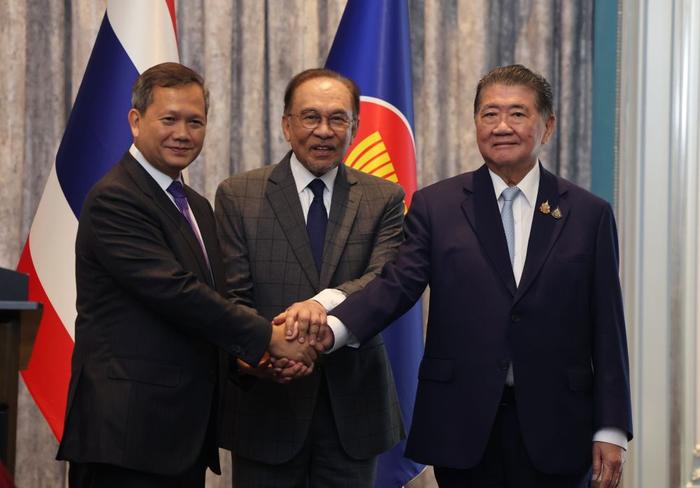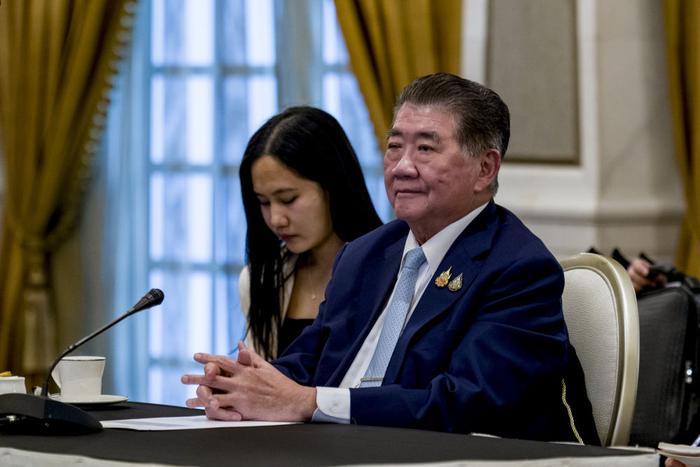

This is a scene from the special meeting on the border situation between Thailand and Cambodia held at the residence of the Prime Minister of Malaysia, captured on July 28. According to Xinhua News Agency in Kuala Lumpur (provided by the Prime Minister’s Office), Thailand’s acting Prime Minister Pratama and Cambodian Prime Minister Hun Sen held talks in Malaysia on July 28. After less than three hours of discussions, both parties announced a “unconditional” ceasefire.
Regional experts believe that the rapid agreement on a ceasefire between Thailand and Cambodia can be attributed to both sides having an inherent desire for dialogue, consultation, and peaceful resolution of conflicts. Additionally, the active mediation efforts by the international community have created a favorable external atmosphere. However, the ongoing land disputes between the two countries have not been resolved. Ensuring the implementation of the agreement and properly managing differences will be key to further restoring peace and stability in the border region.
On the afternoon of July 28, Pratama and Hun Sen led their senior delegations to attend the special meeting on the border situation between Thailand and Cambodia held in Bululaja, Malaysia. The meeting was chaired by Malaysian Prime Minister Anwar.
On July 28, in Bululaja, Malaysia, Prime Minister Anwar (center) shakes hands with Thai acting Prime Minister Pratama (right) and Cambodian Prime Minister Hun Sen (left). Photo by Xinhua News Agency/Malaysia National News Agency.
After the meeting, Anwar stated in a press conference that Thailand and Cambodia agreed to immediately and unconditionally suspend hostilities starting from midnight local time on July 28. “This is a crucial first step towards reducing the situation, restoring peace and security.”
According to Anwar, there were also clear arrangements made for the subsequent process.
Both sides agreed to convene an informal regional commanders’ meeting at 7 am on July 29, and a joint committee meeting of the border will be hosted by Cambodia on August 4. They also agreed to resume direct communication between the prime ministers (prime ministers) of the two countries, as well as foreign ministers and defense ministers, and to develop detailed mechanisms for the execution, supervision, and reporting of the ceasefire together with Malaysia, establishing institutional foundations for long-term peace and accountability.
Malaysia will coordinate with other ASEAN member states to dispatch observation teams, ensuring both sides earnestly fulfill their peace commitments.
Both leaders from Cambodia and Thailand have positively evaluated the talks and their outcomes. Hong Ma Na expressed that the special meeting achieved good results and created conditions for advancing the normalization of relations between the two countries. Puttan stated that the discussions were conducted with sincerity, and the outcomes reflect Thailand’s willingness to actively seek peaceful solutions.
Under the presidency of Anwar, Hong Ma Na and Puttan shook hands in front of the media after the press conference.
The media noted that the ceasefire agreement was announced within less than 3 hours from the start of the afternoon session. Thai and Cambodian experts believe that the rapid agreement reached by both parties is due to multiple factors.
On July 28th, Prime Minister of Cambodia Hong Ma Na attended a special meeting on the border situation between Thailand and Cambodia at the residence of the Prime Minister of Malaysia. Photo provided by the Prime Minister’s Office of Malaysia (by Xinhua News Agency).
One reason is that both Thailand and Cambodia are clear that force cannot resolve their territorial disputes. Both sides do not wish for the conflict to escalate or prolong. The continuous days of conflict have resulted in hundreds of casualties on both sides, with over 100,000 people forced to evacuate the border areas, severely impacting bilateral relations. Thai scholar Song Chai Pakpapawi said that both sides hope to find a way to resolve the conflict, and a ceasefire would be beneficial for both sides. Kim Ping, Director of the Institute of International Relations at the Royal Academy of Sciences of Cambodia, and Bavee Rokha Ngam, Senior Reporter at Thailand’s “Instant News”, both believe that the economic exchanges between Thailand and Cambodia are quite close. The conflict has brought significant economic risks to both countries, potentially damaging border trade and tourism.
Another factor is that both sides have experience in resolving conflicts through negotiations. In 2000, they had signed a memorandum of understanding regarding the border territorial dispute.
In 2008, following the UNESCO’s recognition of the Pak Chong Temple in the border area between Thailand and Cambodia as a World Heritage Site, the sovereignty dispute over this region heated up again, leading to several conflicts that were eventually resolved through negotiations and international coordination.
Furthermore, the international community actively voiced its concerns and participated in mediation. Following the conflicts, various countries around the world urged for peace talks. Experts such as Gan Jiayi from the National University of Malaysia highlighted that China and other nations had made efforts to de-escalate the situation and facilitate negotiations. The ASEAN chaired country, Malaysia, and the ASEAN itself played constructive roles, providing a relatively neutral and culturally aligned platform for dialogue between the conflicting parties.
The key lies in faithfully implementing the ceasefire agreement. According to media reports, after the start of the talks, shelling could still be heard near the Thai-Cambodian border. The Deputy Minister of Defense of Thailand, Nathapol, stated that he had requested the Thai military to continue its border mission until 24:00 local time and then adhere to the ceasefire agreement.
Thai scholar Supanon believed that whether both sides can quickly and effectively fulfill the ceasefire agreement will be crucial for the next steps in the situation and also serve as a barometer for whether the ceasefire can be sustained.
On July 28, Thailand’s acting Prime Minister Pramoj met with a special meeting on the border situation between Thailand and Cambodia at the residence of the Prime Minister of Malaysia. (Photo provided by the Prime Minister’s Office of Malaysia)
Experts from Thailand and Cambodia expressed that continuing the conflict is not in the interests of either country nor those of the region and the international community. They called for both sides to earnestly implement the ceasefire agreement and truly achieve a de-escalation of the situation through further negotiations.
Tong Meng David, a researcher at the Royal University of Phnom Penh in Cambodia, said that the ceasefire agreement is welcome progress. The ASEAN can continue to play a role in promoting a resolution of the Cambodian-Thai situation. Chava Mithieng, Director of the Institute of East Asian Studies at Thailand’s Faculty of Law and Public Policy, mentioned that the final resolution of the conflict depends on the sincerity and willingness to cooperate of the governments of Thailand and Cambodia.
The mediation efforts of ASEAN are conducive to enhancing the confidence of regional countries, and contribute to ensuring a fair and transparent conflict resolution process.